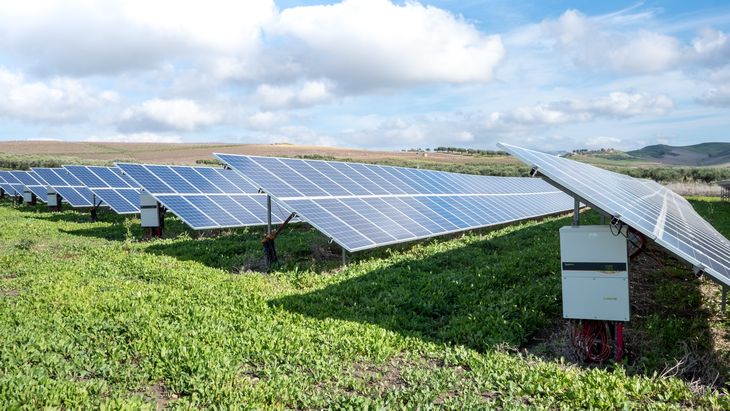Rezolv Energy was created in 2022 to build a portfolio of large-scale renewable energy projects in Central & Eastern Europe (CEE) to offer subsidy-free clean power at long-term stable prices to industrial and commercial users, told us Matej Krušpán, Chief Commercial Officer, Rezolv Energy. The company already has a portfolio of more than 2GW of wind and solar energy in development in Romania, enough to cover the consumption of more than two million people, and a strong pipeline of projects across the rest of the region. The Romanian projects include a 1.04GW solar plant in Arad county, which is expected to be the largest solar PV plant in Europe when it is built, and more than 1GW of wind. With the current projects alone, Rezolv will be able to cover about 8% of Romania’s electricity consumption by 2025. Rezolv’s projects will partly be financed through long-term Power Purchase Agreements (PPAs) with corporates across Europe. The company announces that it is preparing a series of practical online workshops to present concrete energy management optimisation solutions: “Stay tuned for our upcoming webinars dedicated to corporate and industrial consumers“, said Matej Krušpán.

PPAs are long-term electricity contracts for a fixed or indexed price, meaning that customers have certainty about the price they will pay – for up to 20 years. At a time of wildly fluctuating energy prices, this has become a very attractive proposition for companies of all sizes, but particularly for large, energy-intensive firms.
PPAs also offer certainty about the long-term supply of electricity. In the context of the war in Ukraine, which created turmoil in the energy markets, security of supply considerations should not be under-estimated.
Are there other factors driving corporates’ interest in PPAs?
Yes. The other main driver is companies’ sustainability commitments, which drive corporate decision-making in a way that we have never seen before. In 2015, the year the Paris Agreement was adopted, only six of the world’s largest publicly-traded companies had net-zero targets. Now, more than 700 of these businesses have set such a target.
Foreign-owned multinationals are therefore leading the way, and this is directly relevant for CEE because the region has, for the last 30 years, been a very attractive destination for the biggest companies – particularly manufacturing and other large-workforce businesses. This means a large pool of companies with significant, energy-intensive operations in CEE, and renewable energy PPAs hold an obvious appeal for businesses like this.
There is one other factor too. PPAs support the financing of major renewable energy projects. Being associated with projects like this can offer major reputational value for companies.
How mature is the PPA market in CEE?
CEE is definitely still catching up to Western Europe. In Western Europe, about 20GW of sustainable energy PPAs have been negotiated between firms and providers. Spain, Ireland, Germany, France, and the United Kingdom are leading the way. In CEE, only Poland has seen a significant volume of PPA deals so far, and there are two main reasons for that.
The first is the lack of renewable energy supply available in CEE, but that is changing very rapidly, which will create far more opportunities for companies to lock in long-term, competitively priced clean energy to power their operations.
The second is the fact that PPAs are still a relatively new concept in this region. For example, Romania only recently re-introduced PPAs within its regulatory framework, after a 10-year halt. Buyers are therefore still learning how to procure long-term power directly from energy generators rather than signing short-term contracts from energy traders and suppliers. This is a challenge, but something that will improve as they gain more experience with this type of agreement.
Are there any other barriers?
The barriers can vary from country to country. In the Czech Republic, for example, the biggest obstacle is the lack of renewable energy capacity. There are just no major projects being built right now, mainly because of legislative and capacity hurdles.
In Romania, one major issue complicating PPA implementation concerns guarantees of origin (GOOs). Romania is not yet a member of the Association of Issuing Bodies (AIB), which issues and certifies GOOs on a standardized basis known as the European Energy Certificate System (EECS). Membership of the AIB is necessary for cross-border trading of the GOOs, because it provides evidence that the offtaker has procured green electricity. If corporate buyers cannot prove that their electricity consumption is green, then they will not buy power from renewable energy generators located in non-AIB countries such as Romania. We are therefore pushing for Romania to apply for AIB membership as soon as possible and are hopeful that it will happen soon. It would make a big difference.
How would you sum up the outlook for PPAs in CEE?
Overall, I am very optimistic. I think that we are on the verge of a new era of PPA deals in CEE because there are three key requirements for that to happen: renewable energy capacity needs to be coming onstream in volume, there has to be strong, widespread corporate demand for green electricity, and any regulatory barriers to the signing of PPA deals must be cleared away. Fortunately, those three things are, for the first time, coming into alignment in CEE.
Photo by Sungrow EMEA on Unsplash
